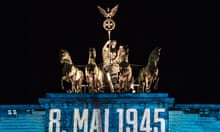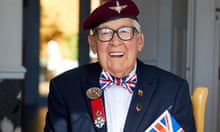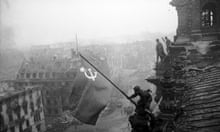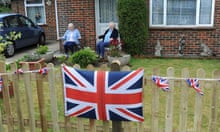Winston Churchill believed a disgruntled general Charles de Gaulle intended to pre-empt the allies’ announcement of victory in Europe by 24 hours but felt unable to pressure him to change his plans, according to British war cabinet documents released free online by the National Archives during the lockdown.
The 75th anniversary of VE Day will be celebrated on Friday 8 May but Gen Dwight Eisenhower, the supreme allied commander in north-west Europe, and the Soviet high command had actually received the German surrender in the French city of Reims on 7 May 1945 at 2.41am.
According to minutes of a meeting of the cabinet held in Downing Street at 6.30pm that day, a protracted negotiation between the US president, Harry Truman, and the Soviet leader, Joseph Stalin, settled on an official announcement of the end of the war in Europe being made by the “three great powers” on 8 May at 9am in Washington, 3pm in London and 4pm in Moscow.
But there was one potential problem in the figure of the increasingly irascible leader of free France.
“The war cabinet were informed that General de Gaulle was intending to announce the German surrender in a broadcast at 8 o’clock that evening [7 May]”, the official minutes record. “It was agreed that General de Gaulle should be informed of the plans for synchronising the announcements by the governments of the United Kingdom, the United States and the USSR and advised to postpone his announcement until a corresponding hour on 8 May. If, however, he was unwilling to accept this advice no further pressure could be brought to bear on him.”
De Gaulle did at the last moment agree to postpone his evening broadcast. He instead gave his address at the same moment as Churchill on 8 May, when the prime minister informed the British people that “we may allow ourselves a brief period of rejoicing, but let us not forget for a moment the toils and efforts that lie ahead”.
The war in the Pacific against Japan was continuing to rage with no apparent prospect of the country’s surrender.
The National Archives, in Kew, London, has closed during the coronavirus pandemic but it has made its digitalised documents free to access and download online.
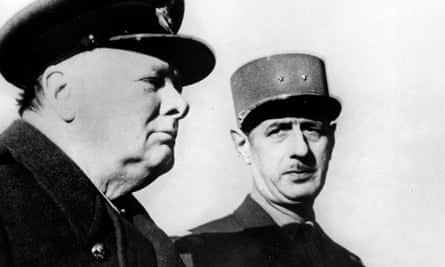
Despite the end of six years of war in Europe, a separate document detailing a conversation between Britain’s ambassador to France, Alfred Duff Cooper, and the French diplomat managing De Gaulle’s cabinet in London, Gaston Palewski, reveals a possible cause of De Gaulle’s initial awkwardness.
Having complained about a less than cordial note from De Gaulle about the future of Syria, a point of contention between the UK and France, Palewski informed Duff Cooper that “the general was in an unhappy mood yesterday as he had just been informed by the United States ambassador that the French zone [of occupied Germany] would not include Cologne”.
“De Gaulle attaches enormous importance to Cologne for strategical reasons which he recently explained to me with the aid of a map,” Duff Cooper informed the prime minister in a diplomatic cable from Paris.
The British diplomat added in his note to Churchill: “I told him that zones of occupation did not, so as I understood, prejudice discussions with regard to frontiers and that for the time being he really should be grateful for British and American troops occupying as much of Germany as possible. The time would come, I felt, when he would be sorry to see them go.”
The unfortunate state of relations between the British prime minister and De Gaulle at the time are clearly elucidated in a cable sent at 11.55pm on VE Day itself by Churchill to Duff Cooper in Paris, marked personal and top secret.
Churchill wrote: “We must discuss the visit of the general here later. It may well be that I could go and see him quietly one of these days on a trip to France, though I should have to know beforehand that he would not have the door banged, barred and bolted against me.”

